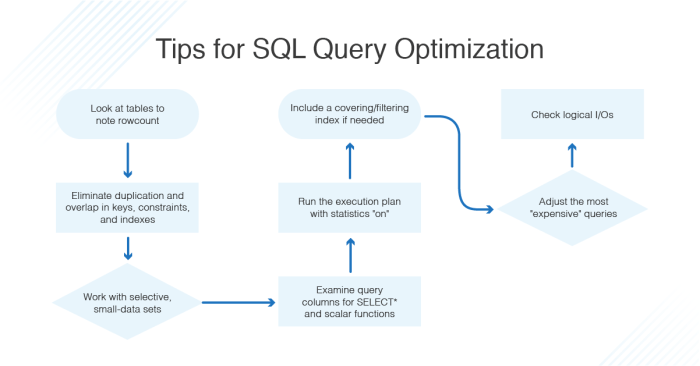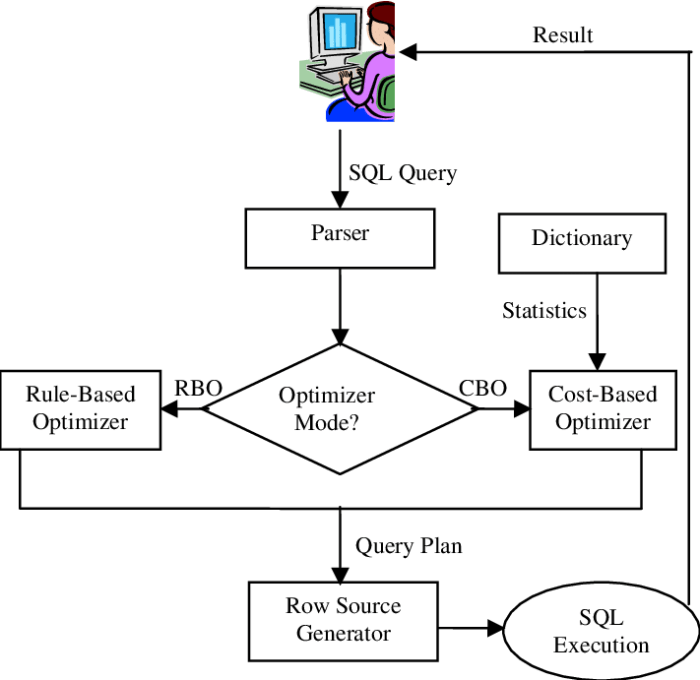The SQL execution activities are performed by the query optimizer, a crucial component of any database management system. It plays a vital role in optimizing the execution of SQL queries, ensuring efficient data retrieval and processing. This article delves into the inner workings of the query optimizer, exploring its role, processes, and techniques.
The query optimizer analyzes incoming SQL queries, identifies the most efficient execution plan, and generates the necessary instructions for the database engine. By optimizing query execution, the query optimizer significantly improves database performance, reduces response times, and enhances the overall user experience.
Query Optimizer Overview
The query optimizer is a critical component of a SQL database system. It is responsible for taking a SQL query and generating an efficient execution plan for that query. The query optimizer uses a variety of techniques to optimize the execution plan, including cost-based optimization and rule-based optimization.
The process of query optimization begins with the parser, which converts the SQL query into an internal representation. The optimizer then analyzes the internal representation of the query and generates a set of candidate execution plans. The optimizer estimates the cost of each candidate plan and chooses the plan with the lowest cost.
The cost of a query plan is typically measured in terms of the number of I/O operations that will be required to execute the plan. The optimizer uses a variety of cost models to estimate the cost of a query plan.
These cost models take into account a variety of factors, including the size of the tables that will be accessed by the query, the number of rows that will be returned by the query, and the type of join operations that will be performed by the query.
Once the optimizer has chosen an execution plan, it generates a set of instructions that will be executed by the database engine. These instructions specify the order in which the tables will be accessed, the join operations that will be performed, and the rows that will be returned by the query.
Query Optimization Techniques
- Cost-based optimization
- Rule-based optimization
- Heuristic optimization
SQL Execution Activities
The query optimizer performs a number of key activities during SQL execution. These activities include:
- Parsing the SQL query
- Generating a set of candidate execution plans
- Estimating the cost of each candidate plan
- Choosing the plan with the lowest cost
- Generating a set of instructions that will be executed by the database engine
These activities are performed in order to ensure that the SQL query is executed efficiently. The query optimizer uses a variety of techniques to optimize the execution plan, including cost-based optimization and rule-based optimization.
The impact of query complexity on optimizer performance is significant. The more complex the query, the more difficult it is for the optimizer to find an efficient execution plan. This is because the optimizer has to consider a larger number of candidate plans and the cost of each plan is more difficult to estimate.
Query Plan Generation: The Sql Execution Activities Are Performed By The Query Optimizer

The process of generating a query plan begins with the parser, which converts the SQL query into an internal representation. The optimizer then analyzes the internal representation of the query and generates a set of candidate execution plans.
The optimizer uses a variety of techniques to generate candidate execution plans. These techniques include:
- Top-down optimization
- Bottom-up optimization
- Heuristic optimization
The optimizer estimates the cost of each candidate plan and chooses the plan with the lowest cost. The cost of a query plan is typically measured in terms of the number of I/O operations that will be required to execute the plan.
Types of Query Plans
- Nested loop join
- Merge join
- Hash join
The type of query plan that is chosen will depend on the specific query that is being executed.
Factors that Influence Query Plan Choice
- The size of the tables that will be accessed by the query
- The number of rows that will be returned by the query
- The type of join operations that will be performed by the query
Query Execution and Optimization

Once the optimizer has chosen an execution plan, it generates a set of instructions that will be executed by the database engine. These instructions specify the order in which the tables will be accessed, the join operations that will be performed, and the rows that will be returned by the query.
The database engine then executes the instructions and returns the results of the query to the user. The optimizer can also perform additional optimizations during query execution. These optimizations include:
- Index selection
- Predicate evaluation
- Join ordering
These optimizations can help to improve the performance of the query.
Execution Strategies, The sql execution activities are performed by the query optimizer
- Sequential scan
- Index scan
- Hash join
The execution strategy that is used will depend on the specific query that is being executed.
Performance Monitoring and Tuning

Performance monitoring is essential for ensuring that SQL queries are executed efficiently. The following tools and techniques can be used for performance monitoring:
- Query logs
- Performance counters
- Profiling tools
Once performance problems have been identified, the following strategies can be used to tune SQL queries:
- Index tuning
- Query rewriting
- Hardware upgrades
By following these strategies, it is possible to improve the performance of SQL queries and ensure that they are executed efficiently.
FAQ Resource
What is the primary role of the query optimizer?
The query optimizer analyzes incoming SQL queries, identifies the most efficient execution plan, and generates the necessary instructions for the database engine.
How does the query optimizer improve database performance?
By optimizing query execution, the query optimizer reduces response times, improves data retrieval efficiency, and enhances the overall user experience.
What factors influence the choice of query plan?
Factors such as the complexity of the query, the size and structure of the database, and the available hardware resources influence the choice of query plan.